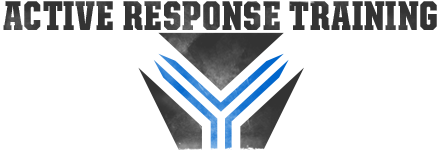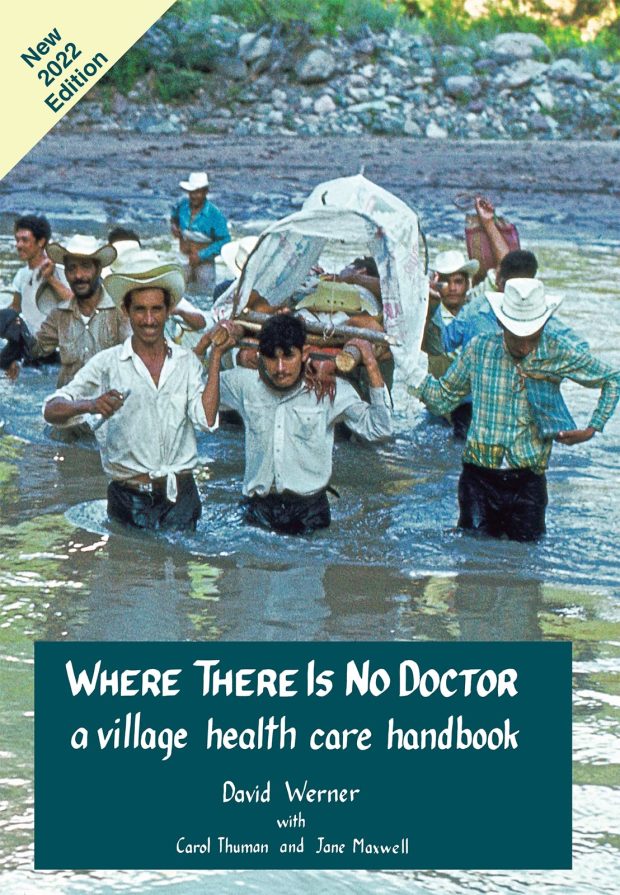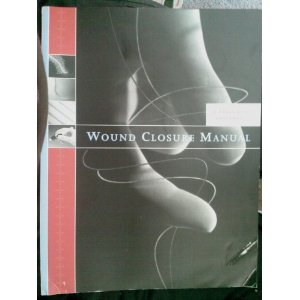It could evolve as medical systems are stressed after a natural disaster. It could be caused by a terrorist attack. It could even be the result of a societal or economic collapse. Have you ever thought about what might happen if our current health care system (EMS, Doctors, Hospitals, Pharmacies) ceased to function normally?
What would you do if you couldn’t go to your doctor, all of the hospitals were shut down, all of the pharmacies closed, and no one answered the phone when you called 911? You would be on your own. You would have to take care of yourself and your family members with the knowledge and supplies you currently have. Could you do it?
Many people have been forced to care for themselves due to partial or full system collapses in recent history. Think about these events:
– Hurricane Katrina
– The 2010 Haitian Earthquake
– The 2006 Tsunami in Thailand
– The Fukishima Nuclear Disaster in Japan
– The economic collapse in Venezuela
– Hospitals being overwhelmed with Covid-19 patients a couple years ago
Those are just the big ones. There have been countless other natural disasters on a slightly smaller scale. Besides the natural events, think about what happened in New York City when the Twin Towers were brought down. Think about the Economic Collapse that affected Argentina for several years. Think about the total societal collapse in the Balkans in the early 1990s.
In each of these events, medical care was limited or non-existent. All of the residents affected had to take care of themselves. I ask again: could you do it?
In order to be successful, you have to have knowledge. With the right medical knowledge, you can acquire, create, or improvise many of the supplies you may need. Fortunately in this digital age, there is a lot of knowledge freely available on the internet. The difficulty lies in sorting through all the crap and trying to discern good information from bad.
Well, I’ve done all that work for you. Below are links to the best available free videos and publications on the internet. These resources are designed primarily for the person who is NOT a medical professional. Most speak in relatively clear language without too much technical jargon. With a little work, anyone reading these books should be able to understand the concepts. Almost all of these references address the issue of austere medical care…what to do when you have relatively untrained practitioners, limited equipment, and no one coming to help. These are the facts and skills you will need to learn if you want to take care of yourself in a system-collapse medical emergency.
Deployed Medicine

The latest Tactical Combat Casualty Care protocols as well as a lot of additional medical information. On this site you will also like to read “The Death of the Golden Hour” which talks about setting up a field hospital in austere conditions opens to PDF) and the Combat Lifesaver Home Study Course.
Medical Treatment of Radiological Injuries
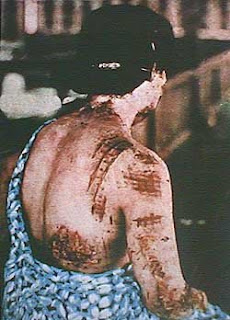
A collection of resources for dealing with injuries caused by nuclear weapons.
Where There Is No Doctor
The most widely-used health care manual for health workers, educators, and others involved in primary health care delivery and health promotion programs around the world. While you are visiting this site, make sure you also download “Where There is No Dentist”, “Where Women Have No Doctor” and “A Book For Midwives.”
You can download all of them at the Hesperian Health Guides site. Print versions are also available HERE as well.
Expedition Dental Article Library

Everything you might want to know about wilderness dentistry.
WRSA “Guerilla Hospital” Series Grid Down Hospital – Part I
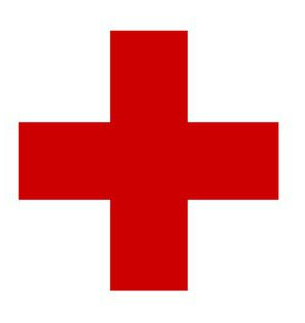
Developing a grid down hospital in austere conditions.
Emergency Trauma Response Training Course
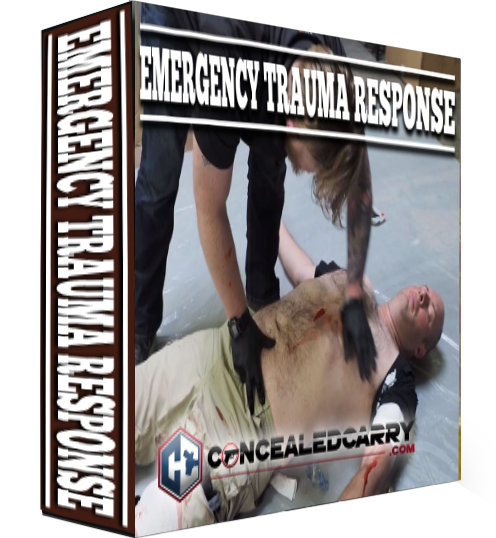
A very good free online training course.
Nerve Block-An easy-to-use, free, bedside app for nerve blocks
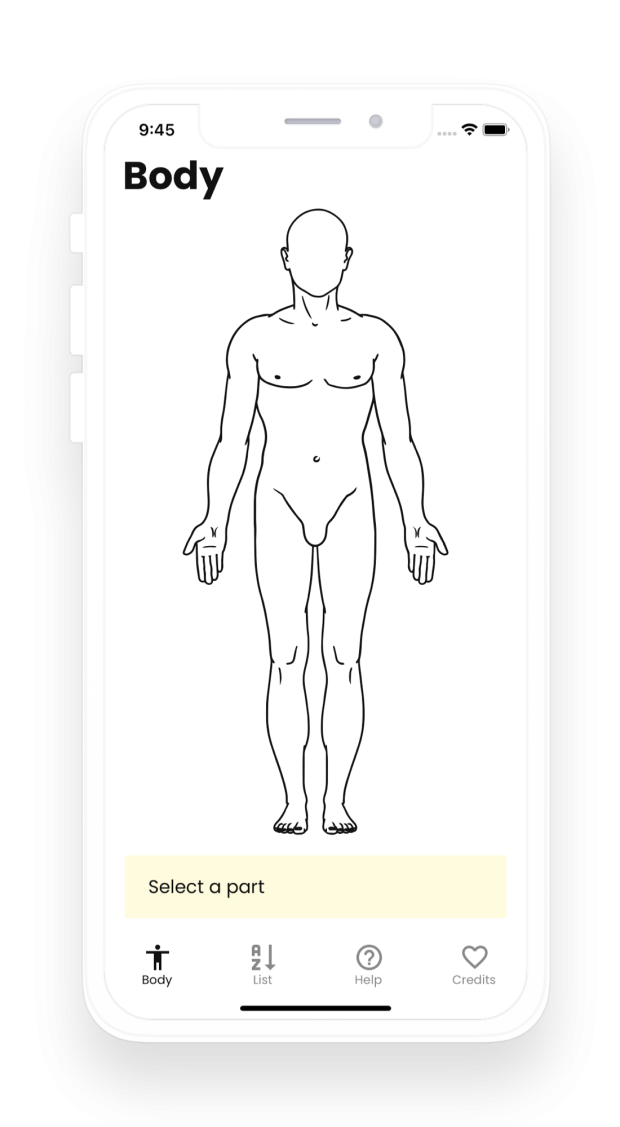
A free app that teaches you how to do nerve blocks if you have access to injectable anesthetics. Since we are discussing apps. you may also find the Suture Laceration Repair App to be useful.
Ethicon Wound Closure Manual
Produced by one of the country’s largest suture manufacturers, this book is literally the bible of how to suture wounds. The book covers the differences between suture sizes and needles as well as all the different suturing techniques. It has excellent photos and shows many different types of wounds and how to sew them up.
For more suturing information, read Basic Knots & Sutures.
Get These Life-Saving Certifications Online for Free
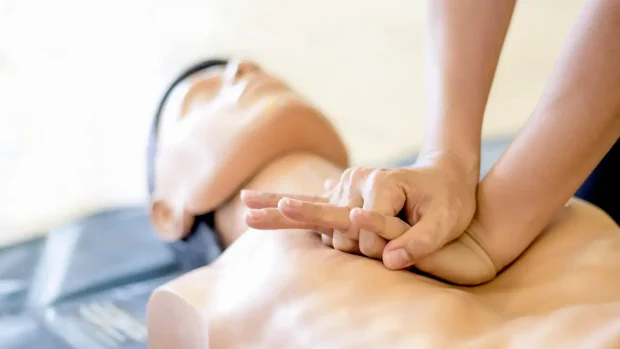
Free online CPR, BLS, and ACLS courses. You can also get a free Stop the Bleed class online as well.
First Aid Field Manual
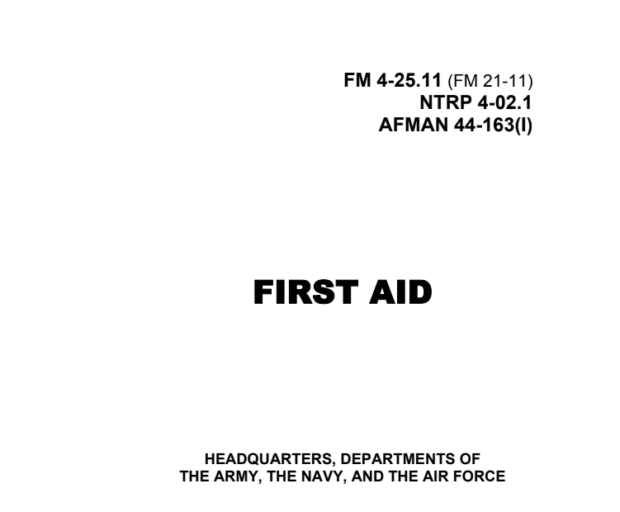
U.S. Military Field Manual (FM-21-11) covering basic first aid for all types of injuries. It was first published in 1943. It’s interesting to contrast the techniques with today’s best practices. We may have to go back to the “old ways” if supply chain disruptions cause a shortage of modern medical gear and pharmaceuticals.
WHO Essential Medicines
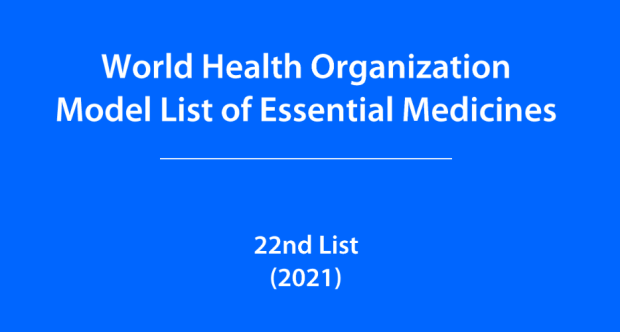
Medicines to consider stockpiling.
Special Operations Forces Medical Handbook

This book is a little more complex than the ones above, but it is still a very valuable reference. There are more current print versions available HERE, if you want a more up-to-date version compared to the one found at the link above.
US Army Medical Courses

Survivor Library’s compilation of military medical references. You might also like his historical anesthesia references and medical diagnostic books from the turn of the 20th century. These resources will be useful if we undergo a complete collapse scenario with no diagnostic or prescription pharmaceuticals available. He also has surgical textbooks from 1807-1913 and from 1900 to 1922.
U.S. Marine Corps Mountain Warfare Center Wilderness Medicine Course
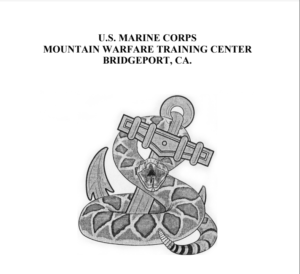
A good first aid and austere medical handbook that makes excellent differentiation between what works in “civilization” and what works in remote conditions without extensive amounts of equipment and support.
Survival and Austere Medicine an Introduction
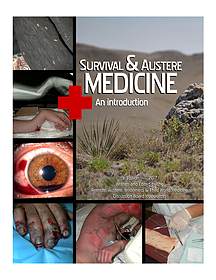
This is one of the best wilderness and primitive medical books available anywhere. If you could only download one reference on this list, this would be my choice.
Medical Management of Biological Casualties

How to treat biological warfare patients.
Ship Captain’s Medical Guide
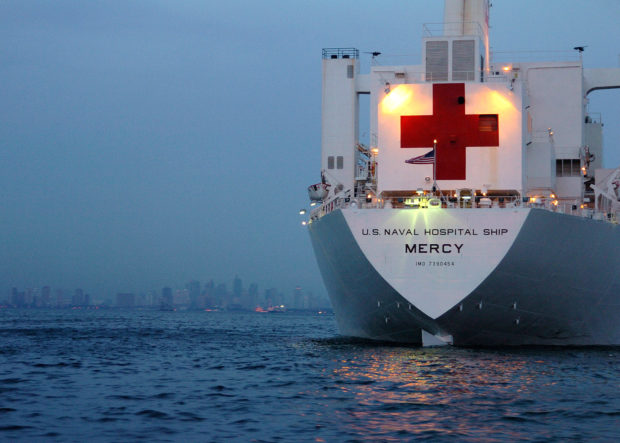
Although primarily concerned with emergencies at sea, this book is an excellent medical guide for a variety of conditions written so that the lay reader can diagnose, understand, and treat most common medical conditions in the absence of more definitive care.
Tactical Combat Casualty Care Training (TCCC) | S12 Nashville 2018
Video of the full 3+ hour training course.
Operational Medicine Videos
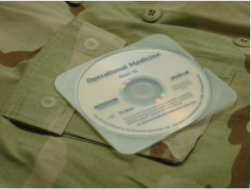 For those of you who prefer to learn skills by watching video rather than reading, this is your site. It is a treasure trove of archived military medical videos on almost every topic available.
For those of you who prefer to learn skills by watching video rather than reading, this is your site. It is a treasure trove of archived military medical videos on almost every topic available.
Primary Surgery
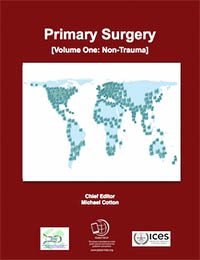
This one is designed to be a surgical manual for doctors who aren’t well trained in surgery. It is simple enough that an educated lay person can understand most of the concepts with a little effort. While it contains great information, no photos are included in this copy.
Practical Plastic Surgery for Nonsurgeons
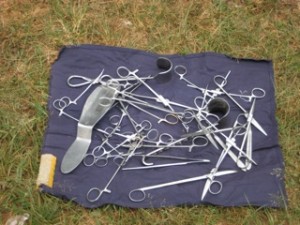 The chapters on suturing, local anesthesia, and treatment of gunshot wounds are exceptionally valuable. Opens to PDF.
The chapters on suturing, local anesthesia, and treatment of gunshot wounds are exceptionally valuable. Opens to PDF.
US Army TCCC Handbook
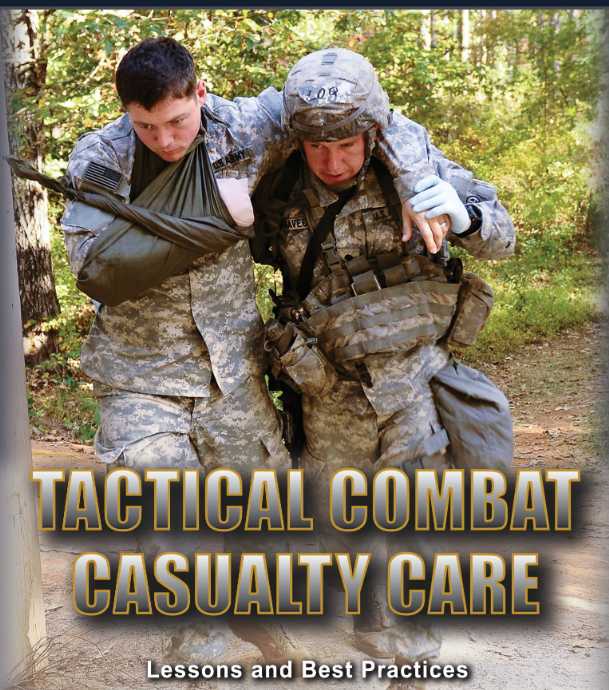
The 2017 Army TCCC manual that contains concise instructions for performing needle decompressions and surgical airways in the field. Opens to PDF.
Clinical Practice Guidelines for Prehospital Prolonged Field Care
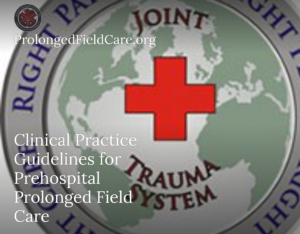
The chapters of wound management and burn care are especially useful. It also contains one of the few complete references for dealing with eye injuries.
Black Rock City First Aid Booklet
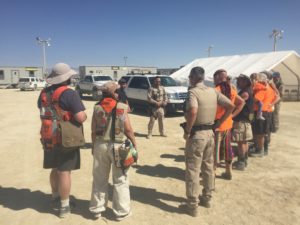
Black Rock City is the third largest city in Nevada. It solely exists during an approximate two-week time period of the Burning Man festival. Black Rock city is exceedingly remote and has a limited amount of medical staff on scene. The entire event focuses on “radical self reliance.” With that in mind, the organizers put together this 10-page first aid manual for the participants.
If you are looking for a very short read that covers most of the important basics, start with this one.
Before you dig into these incredible resources, Allow me to present a couple of caveats….
Reading these books and stockpiling some supplies is not the same as attending medical school. If the healthcare system is functioning properly, use it. Save the knowledge in these books for when you really need it.
Also, there is no substitute for experience. If you have a greater interest in these subjects, classes are available. You will learn much more in a hands-on classroom environment than you will by just reading alone. Medical classes for non-medical personnel are sprouting up nationwide. You can find classes in every subject from Tactical Medicine to Third-World Medicine to Wilderness/Backcountry Medical skills. I’ve taken many of these kinds of classes and even teach some. They are all valuable.
One more tip….
If you anticipate needing these kinds of skills, think about the environment in which you will be practicing. Don’t just save these to your computer. If there are power outages or if there is an EMP event, your computer won’t likely work. Print them out or order the books in hard copy form. There’s nothing like having a real book when the lights go out.
